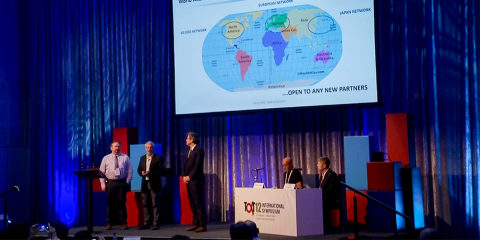Nations join together to announce the World Astatine Community

Representatives from the U.S., EU and Japan announce the World Astatine Community at the 12th International Symposium for Targeted Alpha Therapy.
A collective of nation states have come together for the benefit of humanity with the World Astatine Community (WAC). Unveiled at the 12th International Symposium for Targeted Alpha Therapy, representatives from United States, Japan, and the European Union (EU) announced a collaborative effort to share astatine production technology for the advancement of science and healthcare. The U.S. was represented at the symposium by Dr. Ethan Balkin of the Department of Energy Isotope Program. The European Union was represented by Dr. Jean-Francois Gestin, a researcher and member of Nuclear Medicine Europe—an industry association with direct ties to the EU Commission and Japan was represented by Dr. Takashi Nakano.
Astatine-211 (At-211) has demonstrated significant potential in the treatment of blood, ovarian, and specific types of brain cancers. However, its short half-life of 7.2-hours presents a challenge in generating substantial quantities necessary for therapeutic doses in patients. Success of At-211 as a cancer therapeutic relies on regional production and distribution of the isotope. The DOE IP is a primary producer of At-211 in the U.S. through DOE IP’s University Isotope Network institutions. R&D investments continue to make globally significant contributions to the scientific knowledgebase.
“One nation is not going to be able to produce enough to supply the global demand. It's just not feasible. The 7.2-hour half-life is working against you and there aren't enough cyclotrons or accelerators capable of producing it to facilitate a global supply.” says Ethan Balkin, Program Manager for Radioisotope R&D for the DOE IP. “The WAC seeks to enable global astatine researchers to explore the full-potential of At-211 for therapy”.
The WAC aims to facilitate communication, sharing of technology, and collaborative research globally to optimize and grow regional At-211 production networks internationally.
Increased availability of this promising isotope through international cooperation will motivate clinical interest and make viable clinical medical trials.
The DOE IP made three commitments when joining the WAC:
1. Advance the science of At-211 through domestically funded US research.
2. Partner to enable a global increase in At-211 production capacity.
3. Motivate clinical interest in At-211 through increased availability.
As a first step in meeting its commitments, the DOE IP has made its technological advancements globally available to researchers and industry.
A target station specifically designed for At-211 by the University of Washington Medical Cyclotron Facility, through DOE IP funding, was announced for non-exclusive licensing. The target station is optimized for At-211 production in terms of its target cooling; It can put a substantial amount of beam on target and has robust beam diagnostics built into the station.
The fully automated target station features an 18 mm beam spot and a 90° incident beam on target. This compact station interfaces with standard beamlines and has automated target loading with retrieval that is compatible with commercial transfer systems. Targets can range from a 25.3 mm outer diameter and be up to 20 mm thick. The target materials can be melted foils, sputtered powders and electroplasted crystals.
“This target station is a game changer. There is a uniform target design in which most isotope producers that utilize cyclotrons will recognize. It's a coin type target, so it's not a unique target geometry. The ability to have something that is universally used is advantageous when it comes to getting around the table and freely sharing scientific ideas,” Balkin said.
The WAC is open to all nations that would like to get involved.
For questions regarding the DOE IP involvement in the WAC, please contact Ethan Balkin: ethan.balkin@science.doe.gov.
For questions regarding licensing of the target station, please contact license@uw.edu.




